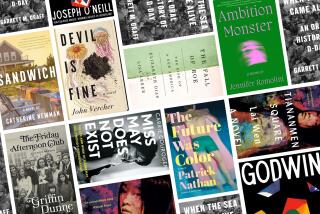‘Cheesemonger: A Life on the Wedge’
- Share via
Cheesemonger
A Life on the Wedge
Gordon Edgar
Chelsea Green: 230 pp., $17.95
It’s hard to imagine a “cheese movement,” but here we are in the age of cheese memoirs! Gordon Edgar’s midlife crisis took the form of a tectonic shift from punk-rock activist to cheesemonger at the San Francisco Rainbow Grocery Cooperative. More than a little activism stuck to Edgar, as he learned more about animal rights, the plight of dairy farmers and the possibilities of delicious, healthy cheese for citizens rich and poor. Edgar’s interest in cheese began with two basic criteria: anything raw and rennetless. Antique Gruyère changed his life. Beaufort d’ Alpage was an education for his palate. “Cheesemonger” is an education for the aspiring enthusiast. Edgar is not into fancy cheese language. He writes in a straightforward way about the taste and the issues behind artisanal cheese-making. He tries not to wax romantic about small-scale food production. “Subculture is elitist,” he acknowledges, “but it’s how some of us survive.”
Ripe
The Search for
the Perfect Tomato
Arthur Allen
Counterpoint: 304 pp., $26
It’s that time of year -- our hopes for the garden expressed in our nostalgia for the perfect tomato. In the end, Arthur Allen breaks it to us gently, there’s no such thing. It exists somewhere in our collective American imagination -- just as the French dream of the perfect bread and the Italians dream of olive oil as it was when they were children. “If we reach our destination,” Allen quotes one of his sources, “we’ll have nothing to do and nowhere to go. We never really want to get there!” Allen takes us on a romp through every variety; every texture and flavor, every existing genetic combination. In the end, he has a better understanding of the great difference between gardening and agriculture. It’s one thing to dream of a flavor, another to re-create it for the masses.
Breakfast With Socrates
An Extraordinary (Philosophical) Journey Through Your Ordinary Day
Robert Rowland Smith
Free Press: 226 pp., $22
How do you know you exist, especially when you first reluctantly wake up in the morning? Descartes figured that “if he was doubting, he had to be thinking. He then realized that only something that exists can think.” Getting ready for your day has a lot in common with being prepared for battle, ready for anything in a chaotic world. Getting to work evokes questions of drudgery, the herd, the effort to distinguish yourself -- Nietzsche style -- from the crowd. Robert Rowland Smith walks us through the day, with side trips to the doctor, the gym, shopping . . . all the way to sleeping and dreaming. He shows us how the great philosophers have addressed the quotidian: “Even as you read these lines, you’ll have that unmistakable sensation, sometimes comforting, sometimes saddening, that things are drawing to a close.” Smith, in this generous exposition, furthers the case for the carefully examined life.
Still Life
Adventures in Taxidermy
Melissa Milgrom
Houghton Mifflin Harcourt: 286 pp., $25
Here’s an odd one, a book that reminds its readers how many subcultures there are in the world. Melissa Milgrom enters the world of trophies and dioramas. She attends conferences and classes. She reads their trade magazines. She takes us to the workshop of the head taxidermist for the American Museum of Natural History and the workshops at the Smithsonian. She watches a prize-winning taxidermist re-create an extinct Irish elk, using genetic clues and Paleolithic cave art. She does some taxidermy herself (stitching paw pads is the hardest part). There is a sense of traveling down into a hidden underworld and up into a world of art and, well, reverence.
Salter Reynolds is a writer living in Los Angeles.
More to Read
Eat your way across L.A.
Get our weekly Tasting Notes newsletter for reviews, news and more.
You may occasionally receive promotional content from the Los Angeles Times.










